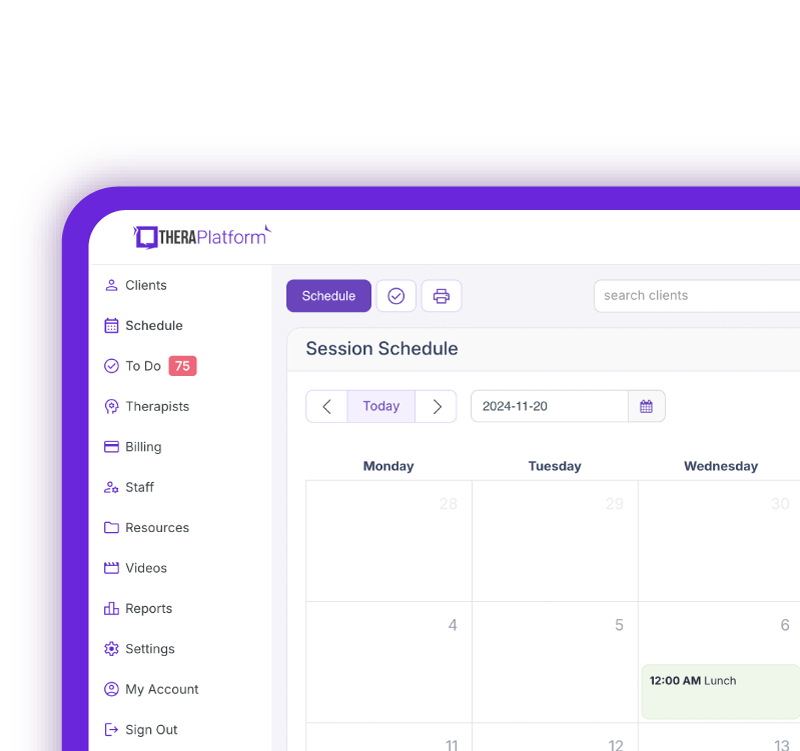99214 CPT code

99214 CPT Code is a Current Procedural Terminology (CPT) code used for evaluation and management (E/M) services provided to established patients, generally by psychiatry or family practice medical staff.
Summary
- The 99214 CPT code is used for evaluation and management (E/M) services involving moderate-complexity medical decision-making, typically lasting 30-39 minutes for established patients in mental health and primary care settings.
- To bill this code, providers must document a detailed patient history, mental or physical status examination, and moderate medical decision-making, including any treatment modifications or risk assessments.
- This code is used for follow-up visits that involve assessing treatment progress, adjusting medications, evaluating therapy effectiveness, and managing conditions such as anxiety, depression, and bipolar disorder.
- Proper documentation is essential to justify billing 99214, and clinicians must follow payer-specific policies to avoid claim denials. Excessive use of the code without justification may lead to audits or reimbursement issues. Enrolling in an insurance billing course for therapists can help providers enhance their knowledge.
- By leveraging an EHR like TheraPlatform for efficient documentation and claim submission, therapists can tackle billing with ease.
→ Click here to enroll in our free on-demand Insurance Billing for Therapists video course [Enroll Now]
This code represents a moderate-complexity visit requiring thorough assessment, decision-making, and care planning lasting 30-39 minutes. It is used in mental health settings when a patient presents with ongoing concerns requiring active monitoring, treatment modifications, or addressing moderate-risk factors.
Compared to lower-complexity codes, the 99214 CPT code signifies a more detailed evaluation and a higher decision-making level, ensuring that the patient's needs are thoroughly assessed and managed effectively.
Streamline your insurance billing with One EHR
- Claim batching
- Auto claims
- Automated EOB & ERA
- Real-time claim validation
- Real-time claim tracking
- Aging and other reports

Providers utilize 99214 CPT code in situations where a patient’s mental health condition necessitates adjustments to therapy, medication management, or additional interventions. This may include monitoring the progression of disorders such as anxiety, depression, or bipolar disorder, adjusting treatment strategies, or evaluating the impact of medication side effects.
By using this code appropriately, clinicians can ensure patients receive the necessary level of care while maintaining proper documentation and compliance with billing regulations.
Patient eligibility and criteria for the 99214 CPT code
To bill for the 99214 CPT Code, the patient must be an established patient, meaning they have had prior visits with the provider. This code is appropriate for situations requiring moderate complexity in medical decision-making. This includes conditions that require ongoing treatment evaluation, medication adjustment, and consideration of risk factors impacting the patient’s mental health.
Specific situations warranting the use of the 99214 CPT code include:
- Follow-up appointments where a patient’s treatment progress is assessed and adjusted.
- Medication management requiring a detailed evaluation of efficacy and side effects.
- Treatment response evaluations, particularly for moderate-risk conditions such as generalized anxiety disorder, major depressive disorder, or bipolar disorder.
- Assessments involving multiple symptoms that impact daily functioning require a structured care plan.
Watch this video to learn common insurance billing struggles and solutions
→ Start My Free Trial
→ Start My Free Trial
Documentation requirements for the 99214 CPT code
Proper documentation is necessary to support the use of CPT Code 99214. The medical record must reflect a detailed history, a relevant examination, and moderate complexity in medical decision-making.
The history should provide a comprehensive review of the patient’s symptoms, past medical history, and current concerns. The examination should assess the patient’s physical and/or mental status, tailored to their specific condition.
Medical decision-making should be clearly documented, including any treatment changes, risk assessments, and modifications to the care plan.
This visit should be sure to include the following components:
- History: A detailed review of the patient’s symptoms, past medical history, and current concerns.
- Examination: A relevant assessment of the patient’s physical and/or mental status, tailored to their condition.
- Medical Decision-Making (MDM): Justification of moderate complexity in decision-making, including treatment changes, risk assessments, and care plan modifications.
For example, appropriate documentation for a 99214 visit may include clinical findings such as increased anxiety levels, worsening depressive symptoms, or medication side effects.
It should also detail adjustments to therapy, including changes in therapeutic approach or modifications in medication dosage.
Additionally, the provider should document risk factors such as suicidal ideation, substance use, or social stressors that may influence the patient’s treatment plan.
Recording these elements ensures that the visit meets the required criteria for the 99214 CPT code and supports accurate billing. Clinicians may also utilize standardized tools, such as the Patient Health Questionnaire-9 (PHQ-9) for depression or the Generalized Anxiety Disorder-7 (GAD-7) assessment, to quantify symptom severity and support medical decision-making.
→ Click Here to Download My Free Mental Health Assessments [Download Now]
Components of an E/M Visit at the 99214 Level
A visit billed under the 99214 CPT code must include moderate-complexity history and examination elements.
This typically involves:
- Reviewing the patient’s condition in depth, including any changes since the last visit.
- Discussing treatment progress and modifying the care plan if needed.
- Addressing ongoing symptoms and identifying any emerging concerns.
- Evaluating potential complications or co-occurring conditions that may impact treatment.
Mental health professionals using the 99214 CPT code often engage in detailed discussions about medication adherence, therapy effectiveness, and necessary lifestyle adjustments to support mental well-being.
Practice Management + EHR + Telehealth
Mange more in less time in your practice with TheraPlatform

Billing and reimbursement guidelines for the 99214 CPT code
A visit billed under the 99214 CPT code must include moderate-complexity history and examination elements. This typically involves reviewing the patient’s condition in depth, including any changes since the last visit, discussing treatment progress and modifying the care plan if needed, addressing ongoing symptoms and identifying any emerging concerns, and evaluating potential complications or co-occurring conditions that may impact treatment.
Mental health professionals using 99214 CPT code often engage in detailed discussions about medication adherence, therapy effectiveness, and necessary lifestyle adjustments to support mental well-being.
These visits provide an opportunity to assess a patient’s response to treatment, discuss any barriers to progress, and collaboratively adjust the care plan to optimize outcomes.
- Correct coding: Ensure that the documentation supports the moderate complexity required for the 99214 CPT code, differentiating it from lower-level codes.
- Billing rates: Reimbursement varies depending on insurance providers, but 99214 CPT code typically reimburses at a higher rate than lower-complexity visits.
- Visit frequency: While the 99214 CPT code is appropriate for follow-up visits, excessive use without justified documentation may lead to claim denials or audits.
- Payer preferences: Different insurance carriers may have specific documentation or coding preferences, so providers should stay updated on payer requirements.
Examples of appropriate clinical scenarios for the 99214 CPT code
To better understand when the 99214 CPT code is appropriate, consider the following clinical scenarios:
- Anxiety disorder follow-up: A patient with generalized anxiety disorder returns for a follow-up. The provider evaluates their response to medication, addresses concerns about side effects, and modifies the dosage accordingly.
- Depression treatment monitoring: A patient with major depressive disorder reports persistent symptoms despite therapy. The provider discusses additional treatment options, including possible medication adjustments and lifestyle interventions.
- Bipolar disorder management: A patient undergoing treatment for bipolar disorder experiences mood fluctuations. The provider assesses their symptom patterns, adjusts medications, and provides psychoeducation on self-monitoring strategies.
- Trauma-Related Stress Evaluation: A patient with PTSD requires ongoing care. The provider reviews their therapy progress, discusses coping mechanisms, and adjusts treatment to address newly emerging symptoms.
Best practices for effective use of the 99214 CPT code
To optimize the use of the 99214 CPT code, providers should follow these best practices:
- Ensure thorough documentation: Detailed notes should clearly support the moderate complexity of the visit, including patient symptoms, treatment decisions, and risk assessments.
- Utilize structured templates: Standardized documentation templates can streamline note-taking while ensuring that all necessary elements are captured.
- Leverage symptom assessment tools: Using validated tools (e.g., PHQ-9 for depression, GAD-7 for anxiety) can provide objective measures to justify the complexity of the visit.
- Proactively manage symptoms: Encourage patients to track symptoms between visits and report changes requiring treatment modifications.
- Stay compliant with billing guidelines: Review payer policies regularly to ensure that coding and documentation practices align with reimbursement requirements.
CPT Code 99214 can be invaluable for mental health providers managing patients with moderate-complexity conditions. Clinicians can maximize reimbursement while providing high-quality care by ensuring appropriate documentation, understanding billing guidelines, and maintaining best practices. Thoughtful application of this code supports comprehensive mental health management, helping patients achieve better treatment outcomes.
Billing guidelines
Mental health providers must adhere to established billing guidelines when using CPT Code 99214.
These guidelines include:
- Time: The time spent face-to-face with the patient and/or on the date of the encounter performing counseling and coordination of care.
- Documentation: The medical record must support the level of service billed.
- Medical necessity: The services provided must be medically necessary for the diagnosis and treatment of the patient's condition.
Best practices
To maximize reimbursement and ensure compliance with billing guidelines, mental health providers should follow these best practices:
- Stay informed: Stay up-to-date on coding and billing guidelines.
- Document thoroughly: Maintain accurate and comprehensive documentation of all patient encounters.
- Use technology: Utilize electronic health records (EHRs) and other technology to streamline documentation and billing processes.
- Seek guidance: Consult with billing specialists or coding experts when needed.
Benefits of proper coding
Proper use of CPT Code 99214 and adherence to best practices can benefit both mental health providers and their patients.
For providers:
- Accurate reimbursement: Proper coding ensures that providers receive fair reimbursement for their services.
- Compliance: Adhering to billing guidelines helps providers avoid audits and penalties.
- Efficiency: Streamlining documentation and billing processes can save time and resources.
For patients:
- Access to care: Proper coding and billing practices help ensure that patients have access to the mental health services they need.
- Continuity of care: Accurate documentation supports continuity of care and facilitates communication between providers.
- Improved outcomes: Comprehensive mental health management can lead to better treatment outcomes for patients.
How EHR and practice management software can save you time with insurance billing for therapists
EHRs with integrated billing software and clearing houses, such as TheraPlatform, offer therapists significant advantages in creating an efficient insurance billing process. The key is minimizing the amount of time dedicated to developing, sending, and tracking medical claims through features such as automation and batching.
What are automation and batching?
- Automation refers to setting up software to perform tasks with limited human interaction.
- Batching or performing administrative tasks in blocks of time at once allows you to perform a task from a single entry point with less clicking.
Which billing and medical claim tasks can be automated and batched through billing software?
- Invoices: Create multiple invoices for multiple clients with a click or two of a button or set up auto-invoice creation, and the software will automatically create invoices for you at the preferred time. You can even have the system automatically send invoices to your clients.
- Credit card processing: Charge multiple clients with a click of a button or set up auto credit card billing, and the billing software will automatically charge the card (easier than swiping!)
- Email payment reminders: Never manually send another reminder email for payment again, or skip this altogether by enabling auto credit card charges.
- Automated claim creation and submission: Batch multiple claims with one button click or turn auto claim creation and submission on.
- Live claim validation: The system reviews each claim to catch any human errors before submission, saving you time and reducing rejected claims.
- Automated payment posting: Streamline posting procedures for paid medical claims with ERA. When insurance offers ERA, all their payments will post automatically on TheraPlatform's EHR.
- Tracking: Track payment and profits, including aging invoices, overdue invoices, transactions, billed services, service providers.
Utilizing billing software integrated with an EHR and practice management software can make storing and sharing billing and insurance easy and save providers time when it comes to insurance billing for therapists.
Streamline your practice with One EHR
- Scheduling
- Flexible notes
- Template library
- Billing & payments
- Insurance claims
- Client portal
- Telehealth
- E-fax

Resources
Theraplatform is an all-in-one EHR, practice management and teletherapy solution that allows you to focus more on patient care. With a 30-day free trial, you have the opportunity to experience Theraplatform for yourself with no credit card required. Cancel anytime. They also support different industries including mental and behavioral health therapists in group practices and solo practices.
More resources
- Therapy resources and worksheets
- Therapy private practice courses
- Ultimate teletherapy ebook
- The Ultimate Insurance Billing Guide for Therapists
- The Ultimate Guide to Starting a Private Therapy Practice
- Mental health credentialing
- Insurance billing 101
- Practice management tools
- Behavioral Health tools
Free video classes
- Free on-demand insurance billing for therapist course
- Free mini video lessons to enhance your private practice
- 9 Admin tasks to automate in your private practice
References
American Medical Association. CPT® code 99214: Established patient office visit, 30-39 minutes | American Medical Association
Centers for Medicare & Medicaid Services. (2022). Evaluation and management services guide. Retrieved from https://www.cms.gov
Coding Ahead. (n.d.). 99214 CPT code description, billing guidelines, & clinical examples. Retrieved from https://www.codingahead.com/99214-cpt-code-description-billing-guidelines-clinical-examples/
Current Procedural Terminology (CPT) codes. (2023). American Psychiatric Association. Retrieved from https://www.psychiatry.org
HealthQuest Billing. (n.d.). CPT code 99214: Detailed billing guidelines & reimbursement rates. Retrieved from https://www.healthquestbilling.com/cpt-code-99214
Medical Bill Gurus. (n.d.). 99214 CPT code description: Billing guidelines, reimbursement, and documentation requirements. Retrieved from https://www.medicalbillgurus.com/99214-cpt-code-description and https://www.medicalbillgurus.com/cpt-code-99214/Billing Insights



